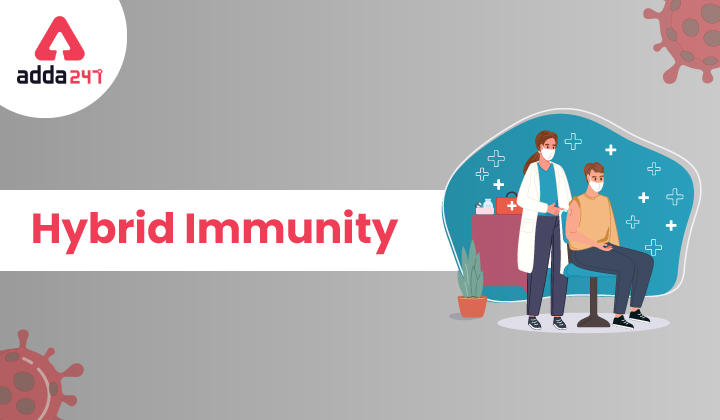G.S. Paper 3: Awareness In The Fields Of It, Space, Computers, Robotics, Nano-Technology, Bio-Technology, Pharma Sector & Health Science
Introduction:
Many recent pieces of research on immunity development with Covid-19 vaccines have shown that a combination of natural infection with a single dose of vaccine provides greater immunity than either natural infection without vaccination or full vaccination in infection-naïve individuals.
What is Hybrid Immunity?
- Hybrid immunity from an infection is a combination of natural protection along with the immunity provided by the vaccine.
- It appears to result in stronger protection than just infection or vaccination alone.
- In the case of Covid-19, hybrid immunity is when someone recovers from a Covid infection before getting vaccinated.
Key Findings:
- Hybrid Immunity typically results in antibody levels that are 25 times higher than vaccination alone and 100 times higher than infection alone, according to a paper in Science.
- Natural immunity from an infection combined with the immunity provided by the vaccine — had a higher and more durable neutralising antibody response.
- Hybrid immunity offers stronger protection than just infection or full vaccination alone.
- Naturally infected individuals who were given a single dose of the vaccine showed additional protection against the Delta variant.
- strength and durability of natural immunity might not be uniform and might vary between people depending on the nature and duration of infection (asymptomatic or symptomatic) and severity of disease (mild, moderate or severe).
- According to Nature, unlike after vaccination, the memory B cells formed after natural infection are more likely to make antibodies that block immune-evading variants.
- Antibody levels are really variable after recovering from infections, and those at the lower end of the spectrum might be more susceptible to reinfections.
- Most people with hybrid immunity likely do not need a booster except those at high risk.
Memory B cells:
- These cells live in the body for a long time, even after all the viruses from the first infection have been destroyed. They stay in the ready-mode to quickly recognize and attack any returning viruses or bacteria.
- The immunological advantage of hybrid immunity arises mostly from memory B cells.
- While the bulk of antibodies after infection or vaccination declines after a short while, the memory B cells, which evolve in the lymph nodes, get triggered on subsequent infection or vaccination.
- So when people who recovered from COVID-19 are re-exposed to the spike protein, the memory B cells are capable of churning out highly potent antibodies.
- Differences between the memory B cells triggered by infection and those triggered by vaccination — as well as the antibodies they make — might also underlie the heightened responses of hybrid immunity. Infection and vaccination expose the spike protein to the immune system in vastly different ways.
- Some studies have also have found that memory B cells in fully vaccinated people without prior infection are growing in number and gaining mutations up to 12 weeks after the second dose, which allows the B cells to recognise and neutralise variants.
Breakthrough Infection:
- A breakthrough infection is an infection with a virus, bacterium or other germs after one has been vaccinated.
- In the case of Covid, vaccine breakthrough infection happens when a fully vaccinated person gets infected with COVID-19.



 TSPSC Group 1 Question Paper 2024, Downl...
TSPSC Group 1 Question Paper 2024, Downl...
 TSPSC Group 1 Answer key 2024 Out, Downl...
TSPSC Group 1 Answer key 2024 Out, Downl...
 UPSC Prelims 2024 Question Paper, Downlo...
UPSC Prelims 2024 Question Paper, Downlo...




